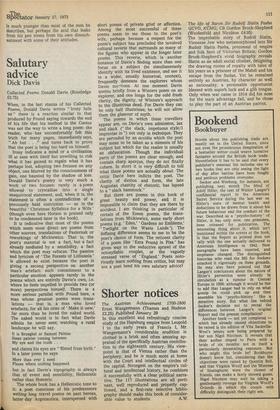Salutary advice
Dick Davis
Collected Poems Donald Davie (Routledge £3.75) When, in the last stanza of his Collected Poems, Donald Davie writes "Irony fails us " there is a reaction similar to that produced by Pound saying towards the end of his life that his method in the Cantos was not the way to write a long poem: the reader, who has uncomfortably felt this truth for many pages, immediately says, Ah but . . ." and turns back to prove that the poet is being too hard on himself.
Irony indicates a mind or a civilisation ill at ease with itself but unwilling to risk What it has gained to regain what it has Perhaps lost, adopting two focuses on any object, one blurred by the consciousness of gain, one haunted by the shadow of loss. Donald Davie's poetry is very much a work of two focuses: rarely is a poem allowed to crystallise into a single unequivocal statement, and, when it is, the statement is often a contradiction of a Previously held conviction — as in the beautiful ' Christmas Syllabics for a Wife ' (though even here Horace is praised only to be condemned later in the book).
It is indicative that most of the poems Which seem most direct are poems from other sources, translations of Pasternak or reworkings of Mickiewicz. That is, the Poet's material is not a fact, but a fact already mediated by a sensibility, a fact Which the poet may refocus. The passion and lyricism of 'The Forests of Lithuania' is allowed to exist because the poet is giving a second perspective on another man's artefact: such commitment to a particular emotion appears rarely in the poems which are entirely Davie's own, i.e. Where he feels impelled to provide two (or more) perspectives himself. There is a more serious parallel with Pound here, .a man whose greatest poems were translations — that is, a man who loved artefacts, for all his cries of 'Make it new,' far more than he loved the naked world. The naked world is in fact what Davie admits he never sees; watching a rural landscape he will say,
It is Brueghel or Samuel Palmer Some painter coming between My eye and the truth . . .
and claims his eyes are "filmed from birth." In a later poem he says More than ever I need
Places where nothing happened
but in fact Davie's topography is always that of event and sensibility, Hellenistic rather than Homeric.
The whole book has a Hellenistic tone to it: a poet conscious of his predecessors writing long travel poems on past heroes, latter day Argonautica, interspersed with short poems of private grief or affection. Among the most successful of these poems seem to me those to the poet's wife, perhaps because a respect for the poem's subject has precluded the involved cultural reverie that surrounds so many of the figures who appear in the longer later poems. This reverie, which is another instance of Davie's finding more than one focus on a subject (to simultaneously identify with its lived existence, and see it in a wider, usually historical, context), frequently demeans the explorers whom Davie me-tions. At one moment Davie quotes briefly from a Winters poem on an explorer, and one longs for the cold fresh clarity, the dignity, of Winters's approach to the illustrious dead. For Davie they can be only half illustrious; he will not allow them the glamour of myth.
The poems in which these travellers appear are, on Davie's own admission, lax and slack (" the slack, impetuous style/I improvise in ") not only in technique. They are pervaded by an accidia which the poet may mean to be taken as a mimesis of his subject but which for the reader is usually an obfuscation. Though the individual parts of the poems are clear enough, and contain sharp apergus, they do not finally cohere. In short it is very difficult to tell what these poems are actually about. The critic Davie here indicts the poet. The clarity of diction and form, the late Augustan chastity of rhetoric, has lapsed to a "slack hammock."
But there are poems in this book of great beauty and power, and it is impossible to claim that they are there by accident. I am thinking in particular of certain of the Essex poems, the translations from Mickiewicz, some early short poems (e.g. 'Eden,' Gardens no Emblems,' 'Twilight on the Waste Lands '). The defining difference seems to me to be the poet's choice of form. The reticent clarity of a poem like 'Ezra Pound in Pisa' has given way to the seductive sprawl of the octosyllabic couplet, or the vaguely stressed verse of 'England.' Poets notoriously learn nothing from critics, but may not a poet heed his own salutary advice?


































 Previous page
Previous page